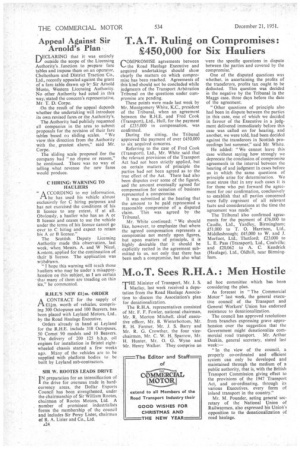T.A.T. Ruling on Compromises: £450,000 for Six Hauliers
Page 26

If you've noticed an error in this article please click here to report it so we can fix it.
rOMPROM1SE agreements between the Road Haulage Executive and acquired undertakings should show clearly the matters on which compromise has been reached. Agreements of this kind should not be concluded while judgments of the Transport Arbitration Tribunal on the questions under compromise are pending.
These points were made last week by Mr. Montgomery White, K.C., president of the Tribunal, when an agreement between the R.H.E. and Fred Cook (Transport), Ltd., Hull, for the payment of £235,000 in compensation, was confirmed.
During the sitting, the Tribunal approved the payment of over £450,000 to six acquired concerns.
Referring to the case of Fred Cook (Transport), Ltd., Mr. White said that the relevant provisions of the Transport Act had not been strictly applied, but on certain matters of principle the parties had not been agreed as to the true effect of the Act. There had also been disputes over some of the figures, and the amount eventually agreed for compensation for cessation of business represented a compromise.
It was submitted at the hearing that the amount to be paid represented a reasonable compromise of a disputed claim. This was agreed by the Tribunal.
Mr. White continued: "We should like, however, to emphasize that where the agreed compensation represents a compromise not merely upon figures, but upon matters of principle, it is highly desirable that it should be explicitly recited in the agreement submitted to us. not only that there has been such a compromise, but also what were the specific questions in dispute between the parties and covered by the compromise."
One of the disputed questions was whether, in ascertaining the profits of the transferors, profits tax ought to be deducted. This question was decided in the negative by the Tribunal in the Maggs case, three days before the date of the agreement.
"Other questions of principle also had been in dispute between the parties in this case, one of which we decided in favour of the Executive in a judgment delivered immediately before this case was called on for hearing, and another, we were told, had been decided against the transferors in Scottish proceedings last summer," said Mr White.
He added: "We cannot leave this case without saying how strongly we deprecate the conclusion of compromise agreements in the interval between the hearing of and judgment in cases before us in which the same questions of principle arise for determination. We must stress that in any such cases it is for those who put forward the agreement for our confirmation, conclusively to establish that all parties concerned were fully cognisant of all relevant facts and considerations at the time the agreement was made."
The Tribunal also confirmed agreements for the payment of £76,000 to Caudle, Ltd., Yardley, Birmingham; £51,000 to T. 0. Harrison, Ltd., Middlesbrough; £45,000 to W. and J. Morfoot, Ltd., Thetford; £23,000 to L. E. Pass (Transport), Ltd., Coalville; and £20,062 to A. C. Kendrick (Haulage), Ltd., Oldhill, near Birmingham.












































































